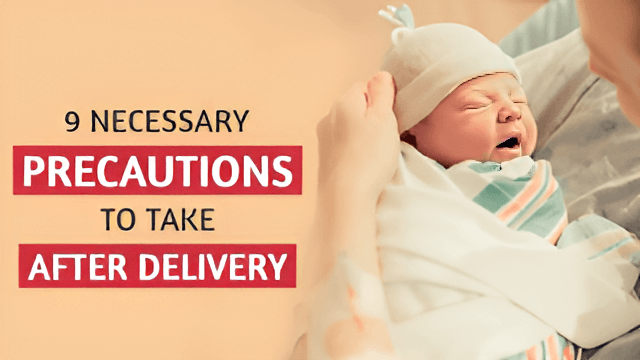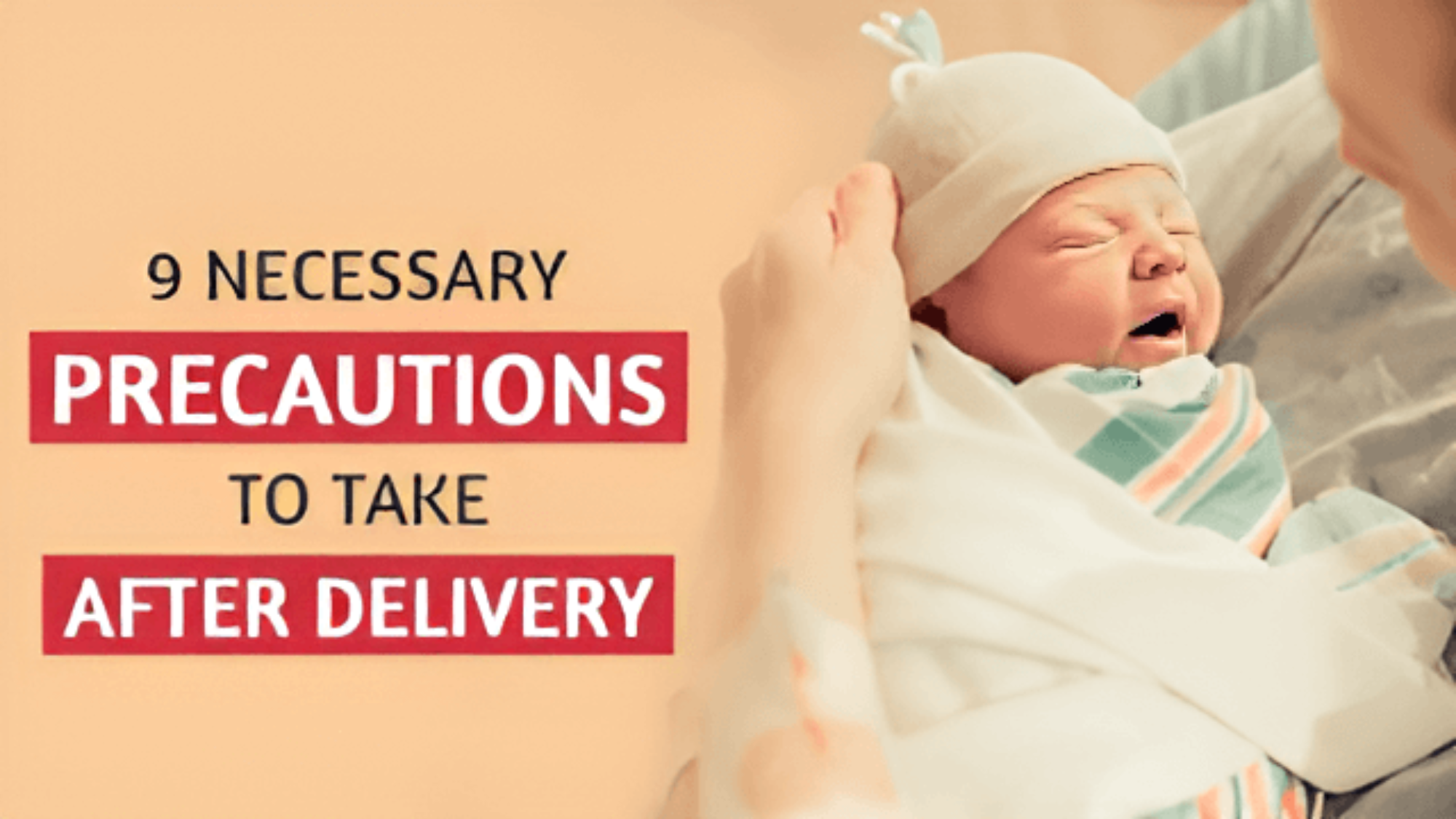
The first few months after your delivery can be particularly challenging. This is also known as the postpartum stage in the life of a woman. It is very significant as it is during this time, your body will undergo several kinds of changes. Because of that, you must take these nine necessary precautions after delivery. For instance, it will develop in a way to meet its requirements and get back to normal life.
This postpartum stage starts after your delivery and when you return to your normal state. During these six to eight weeks, you have to follow certain precautions to take good care of yourself. Like, you need to have good nutrition, rest, and sleep.
You must have to follow these 9 necessary precautions after delivery:
Take these precautions after delivery
Asking for help
One of the most important precautions after delivery is asking for help when needed. The postpartum period can be physically and emotionally challenging, and it’s essential to recognize when you need support. Whether it’s assistance with household duties, caring for your newborn, or emotional support, don’t hesitate to reach out to your partner, family members, or friends. By asking for help, you can reduce stress, prevent weakness, and prioritize your well-being as you navigate the early days of motherhood.
Babies need a lot of time and effort to look after. Their needs and demands change almost every day. This makes it hard for new parents to cope well with the changes.
If your partner and you are working individuals, then it can become more demanding. At this time, you can hire help for other household activities. In other cases, you can ask for help from a close family member whom you trust for a few days.
A crucial part of caring after delivery for new moms is asking for assistance when needed, as this enables them to focus on their recovery. and the needs of their newborn. A new baby’s arrival is a happy event, but it also brings with it a lot of challenges and major physical and emotional changes.
Getting help from friends, family, and medical professionals can help the adjustment to parenthood go more smoothly and manageably. Pregnant women should prioritize self-care after giving birth and accept help with daily tasks like cooking, cleaning, and taking care of older children.
Asking for assistance allows new moms, particularly those who have had an emergency cesarean section or experienced difficulties during delivery, to relax and recover from the physical demands of childbirth. It also offers chances to strengthen the bond between you and your baby and get used to the new schedule and tasks of parenthood.
Additionally, getting support can be advantageous for one’s mental and emotional health, since new moms may go through a variety of emotions, such as tiredness, anxiety, and feelings of dissatisfaction Speaking with dependable people during this trying time a partner, family member, or medical professional can calm and improve you.
Eating nutritious foods
Following the wonderful experience of giving birth, your body needs additional support and nutrition to help in recovering from it. Eating a healthy diet is one of the most important precautions after delivery. These foods support your general well-being during this period of transformation, in addition to providing your body with essential vitamins and minerals for recovery.
New mothers often forget to eat and skip their meals. However, mothers who are breastfeeding need to eat nutritious foods and not skip meals. These foods will not only enhance your recovery during the post-partum period but also boost the health of your feeding baby. Having a healthy diet is beneficial for nursing your newborn baby.
You can eat several foods that are rich in nutrition. These include cereals, protein legumes, fruits, dairy, vegetables, and grains. Remember that your food must contain calcium, iron, and protein. This will ensure that you remain healthy.
Using nutritious foods is necessary for new mothers to promote their recovery and ensure the health of their unborn child, both during and after childbirth. For new mothers, the following birth period often known as the fourth trimester is a period of serious physical and psychological change. To support breastfeeding, promote recovery, and replace energy stores, proper nutrition is essential.
Pregnant women must continue eating a balanced diet full of necessary nutrients like protein, carbs, healthy fats, vitamins, and minerals after giving birth. Foods high in nutrients not only supply the body with the nutrients it needs for nursing but also aid in supplying the stores that are lost during pregnancy and childbirth.
Taking rest
The journey of becoming pregnant is lovely and full of hope and excitement, but it also involves major physical changes and adjustments for the body. Rest is one of the most important things you can do to ensure a healthy pregnancy. Knowing how to get enough sleep and how important it is can help a pregnant woman and her unborn child greatly.
Your body needs lots of rest following the exciting but physically taxing experience of giving birth to repair itself. Taking rest is not just a luxury but a crucial precaution after delivery to ensure a smooth and healthy recovery journey.
In the first few weeks, your focus must primarily be on taking care of yourself and feeding your baby. You have to sleep when your baby sleeps. This time can range from a few minutes, but they are essential for your rest.
You can also save time and steps. Keep your baby close during the nighttime so that you do not have to get up every time you need to feed. It’s normal for your guests and family to see your baby after delivery. But, you do not have to take up the responsibility of entertaining them; take a rest when you have to without feeling guilty.
Using pads and avoiding tampons
Following childbirth, your body goes through an amazing healing and recovery process in the days and weeks that follow. An essential precaution after delivery involves properly managing bleeding after delivery, usually referred to as bowel movements. It’s critical to know the significance of switching to pads during this period rather than pads to facilitate recovery and lower the possibility of complications.
The process of Lochia refers to the time when the lining of the uterus sheds after your delivery. During this phase, you will bleed similar to the time of menstruation. This will go on for around six weeks. And it can make you prone to some infections. Using pads will lower the risk of any infection.
Your body will naturally and consistently bleed after giving birth as the inside of your womb sheds to make room for your growing baby. The term “lochia” refers to this type of bleeding that typically continues for several weeks and gradually lessens in volume.
After giving birth, using pads instead of sanitary napkins is a critical precaution after delivery to encourage healing, protect against infection, and guarantee comfort during the recovery phase. You can effectively manage bleeding after delivery and support the recovery process of your body by selecting the right products, maintaining proper sanitation, and keeping an eye out for any signs of complications. To navigate after childbirth with confidence and ease, keep in mind to prioritize self-care, pay attention to your body’s needs, and seek support from healthcare providers as needed.
Cleaning your hands
Keeping your hands clean after giving birth is essential to preventing infections in both you and your baby. After giving birth, washing your hands usually is an effortless but powerful precaution after delivery that can greatly lower the risk of infection and encourage a speedy recovery.
It is essential to clean, wash, and sanitize your hands frequently. For instance, you must do this every time after you change the baby’s diaper, visit the bathroom, or before feeding. Babies and new mothers are prone to few infections. So, take care accordingly.
Staying hydrated
Maintaining water after delivery is crucial for your body’s recovery and general health. Drinking enough water is an essential precaution after delivery that can help avoid problems, encourage healing, and facilitate a full recovery.
Have plenty of fluids after you get done with your delivery. Milk, water, and juice are some of the good choices. It will help you prevent problems such as constipation. You have to consume foods that are fiber-rich and balance them by remaining hydrated.
Taking a Sitz bath
Your body may experience discomfort, swelling, and soreness in that area in days and weeks after giving birth. Gentle and helpful precautions after delivery that can help with these signs, healing, and general comfort during the following delivery is to take a sitz bath.
A sitz bath is like sitting in a few inches of warm water. This is done after passing the bowels. It can help reduce any form of vaginal soreness.
Getting massages
You can get some massages done during this time. These include massaging with olive oil, sesame oil, and coconut oil. Sesame oil helps in regulating blood pressure and stress. It also comes with some cooling properties.
Conclusion
You can encourage a quick and healthy recovery process by including these post-precautions after delivery into your routine. Always prioritize self-care, pay attention to your body, and ask for help when you need it from loved ones and medical professionals. You can maximize your well-being and fully savor the priceless early motherhood moments by being proactive about taking care of yourself during the time following delivery.
Many women experience weakness after their pregnancy, and they often slip into postpartum depression. Hence, you need to take care of your body to keep yourself and your baby healthy.

Leave Your Comment